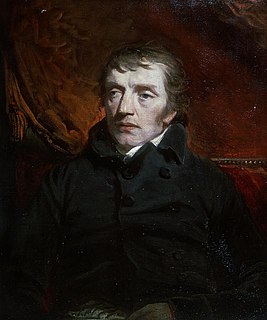A Quote by William Godwin
The mind of a child is no less vagrant than his steps; it pursues the gossamer and flies from object to object, lawless and unconfined, and it is equally necessary to the development of his frame that his thoughts and his body should be free from fetters.
Related Quotes
The master in the art of living makes little distinction between his work and his play, his labor and his leisure, his mind and his body, his information and his recreation, his love and his religion. He hardly knows which is which. He simply pursues his vision of excellence at whatever he does, leaving others to decide whether he is working or playing. To him he's always doing both.
The great object of Education should be commensurate with the object of life. It should be a moral one; to teach self-trust: to inspire the youthful man with an interest in himself; with a curiosity touching his own nature; to acquaint him with the resources of his mind, and to teach him that there is all his strength.
All that is limited by form, semblance, sound, color is called object. Among them all, man alone is more than an object. Though, like objects, he has form and semblance, He is not limited to form. He is more. He can attain to formlessness. When he is beyond form and semblance, beyond "this" and "that," where is the comparison with another object? Where is the conflict? What can stand in his way? He will rest in his eternal place which is no-place. He will be hidden in his own unfathomable secret. His nature sinks to its root in the One. His vitality, his power hide in secret Tao.
The question so often asked of modern painting, "What is it?", contains more than the dull skepticism of the man who is not going to have the wool pulled over his eyes. It speaks of a fundamental placement in relation to the work, that of a voyager in the world coming upon a strange object. The reader reconstitutes the work by his active participation, by approaching the object, tapping it, shaking it, holding it to his ear to hear the roaring within. It is characteristic of the object that it does not declare itself all at once, in a rush of pleasant naïveté.
It is natural that a man should consider the work of his hands or his brain to be useful and important. Therefore nobody will object to an ardent experimentalist boasting of his measurements and rather looking down on the 'paper and ink' physics of his theoretical friend, who on his part is proud of his lofty ideas and despises the dirty fingers of the other.
Experiment and Theory in Physics
Man in his raw, natural state as he comes from the womb is morally and spiritually corrupt in disposition and character. Every part of his being-his mind, his will, his emotions, his affections, his conscience, his body-has been affected by sin (this is what is meant by the doctrine of total depravity)
When Heaven is about to confer a great office on a man, it first exercises his mind with suffering, and his sinews and bones with toil ; it exposes his body to hunger, and subjects him to extreme poverty ; it confounds his undertakings. By all these methods it stimulates his mind, hardens his nature, and supplies his incompetencies.







































